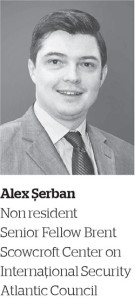The seventh edition of the Atlantic Council Energy & Economic Summit, inaugurated in 2009 in a first session in Bucharest, took place from 18 to 20 November in Istanbul. The main goal: building bridges in a comprehensive geopolitical area, with stretch from Central Asia to Europe. Based on current challenges, the Summit aimed, among others, to identify principles by which an energy strategy of the West for the Black Sea region can generate public policies and projects for its beneficiaries, in the future. This recognition of the importance of the area in which our country is located joins other complex topical subjects such as the European Energy Union, Eastern Mediterranean gas resources, the future of countries like Iraq and Iran, the Caucasus and North Africa.
 The summit brought together a constituency of international influence in order to promote and strengthen transatlantic energy commitment, focusing on political and economic challenges of the moment. The effort is part of the overall mission of the Atlantic Council, one of the most influential think-tanks in Washington, which brings together professionals from large areas, with the role of identifying viable solutions for sustainable development.
The summit brought together a constituency of international influence in order to promote and strengthen transatlantic energy commitment, focusing on political and economic challenges of the moment. The effort is part of the overall mission of the Atlantic Council, one of the most influential think-tanks in Washington, which brings together professionals from large areas, with the role of identifying viable solutions for sustainable development.
The strong presence exercised by the Council in Istanbul and the Black Sea region promotes a commitment based on the crucial role assumed by the Euro-Atlantic community in addressing the global geopolitical challenges, substantiating the values and principles that countries in the region must follow to create a common long-term energy strategy.
In the context of the dependence of member countries of the European Union on gas resources in the East, there is an attempt to minimize the influence of the Kremlin on the Southeast European energy sector, the transatlantic community discovering that it needs to develop an Energy Strategy at the Black Sea so as to expand gas interconnections on various corridors, especially the North-South corridor and to develop other resources and complementary projects.
A major concern of the organizers of the European Union referred to the need to create conditions for dialogue between its members, since differences in dependence on Russian gas and dichotomous approach towards nuclear energy continue to present obstacles to regional energy security. The premiere of this event was the West’s focus on the importance of the Black Sea region in the European energy security. In this regard, the aim was at encompassing a shared vision of the United States, European Union and partner countries over threats coming from energy dependence on Russia. This vision will pursue opportunities for the Black Sea area and will generate a common regional approach to energy.
Romania’s position in the area gives it a privileged status in the wider Black Sea region and a strong geopolitical influence in approaching the Southeast European area. Romania’s presence at the summit was noticed and supported by a broad participation in discussions on North-South Corridor projects, geopolitics in the region and their impact on common strategies in the energy sector. However, given that all global actors, nations or companies, are defining their new lines for future development in the energy sector, Romania is currently deficient in that it failed to agree on a national energy strategy – necessary to apply an action plan and to contribute concretely, on its basis, to drafting energy and security strategies aimed at the Black Sea region.
————————————-
The full version of this article can be read in printed edition of energynomics.ro Magazine, issued on December 2015.
In order to receive the next issue (March 2016) of energynomics.ro Magazine for free, we encourage you to write us at office@energynomics.ro to include you in our distribution list.
